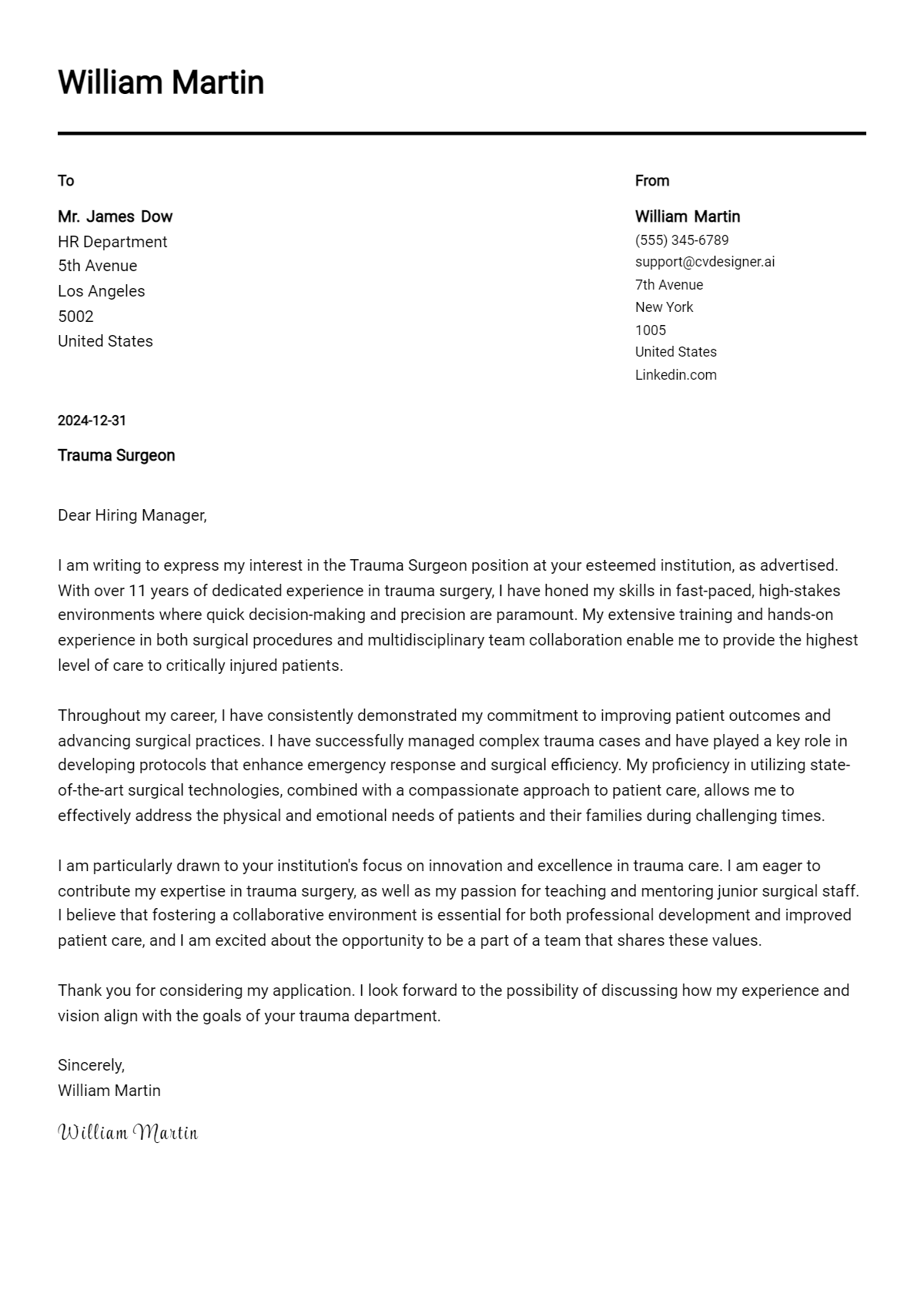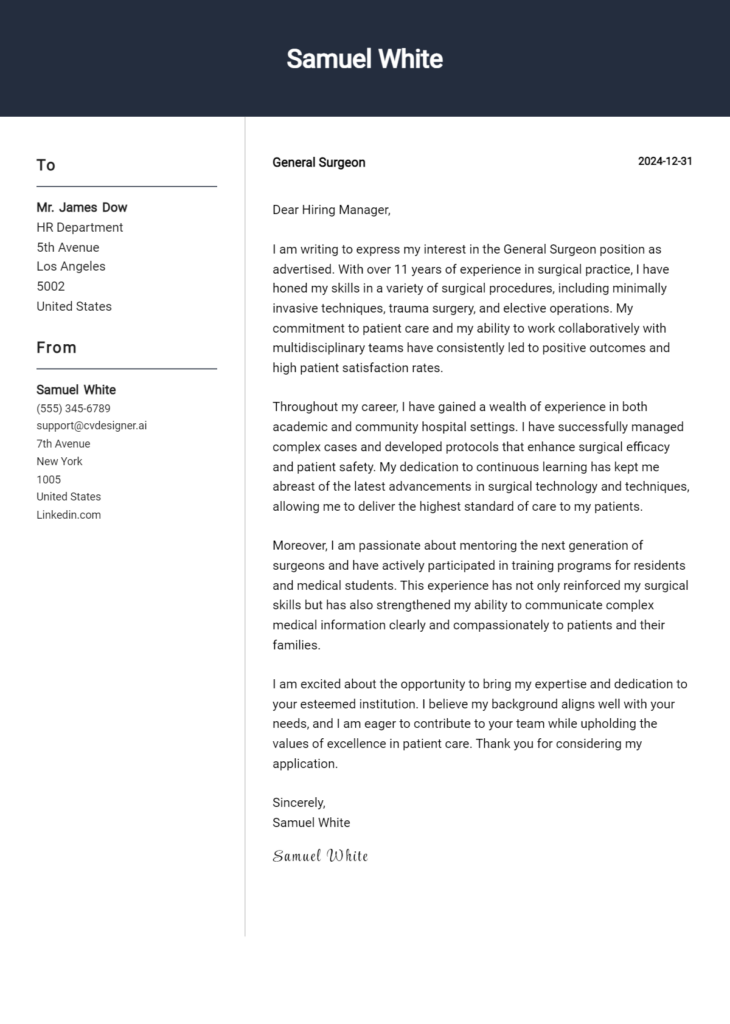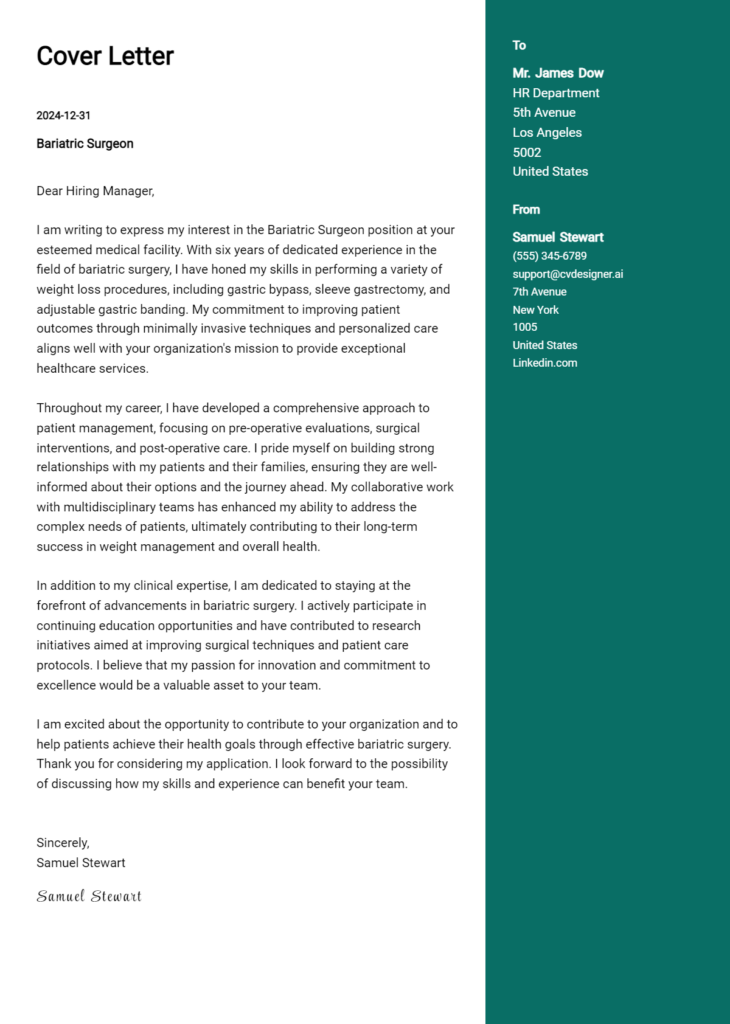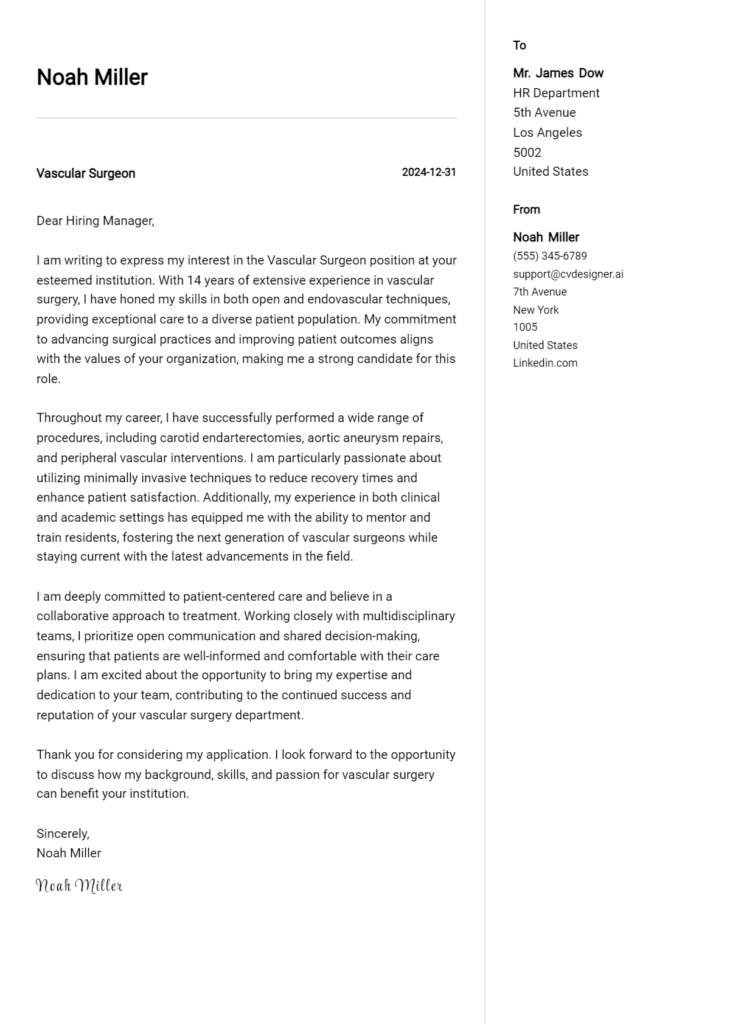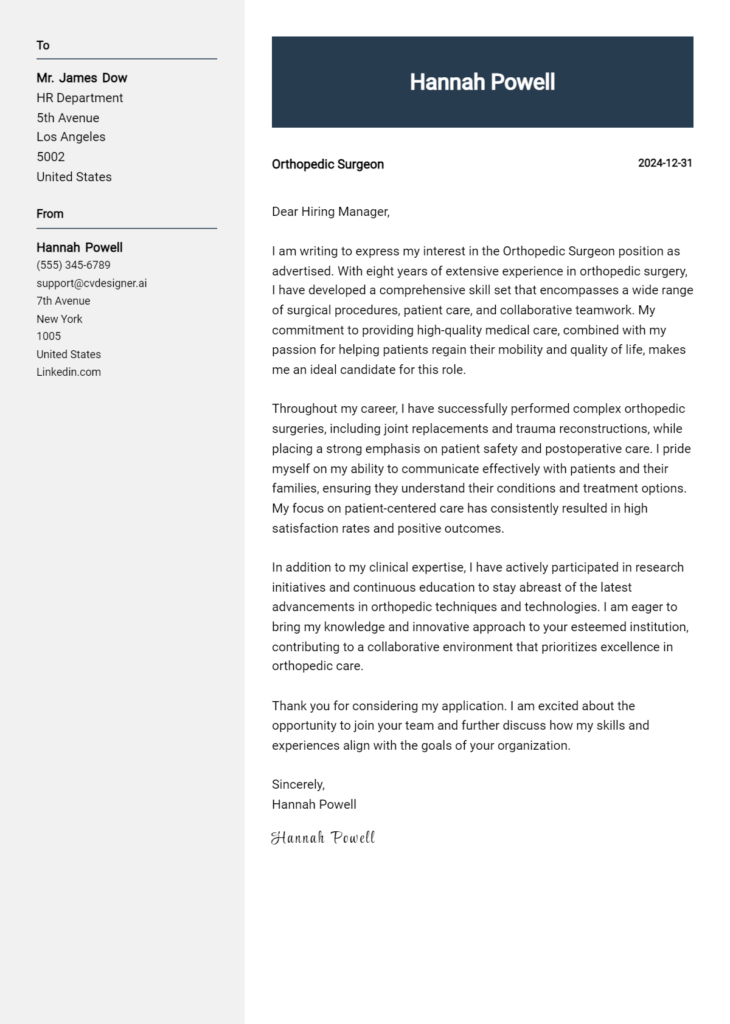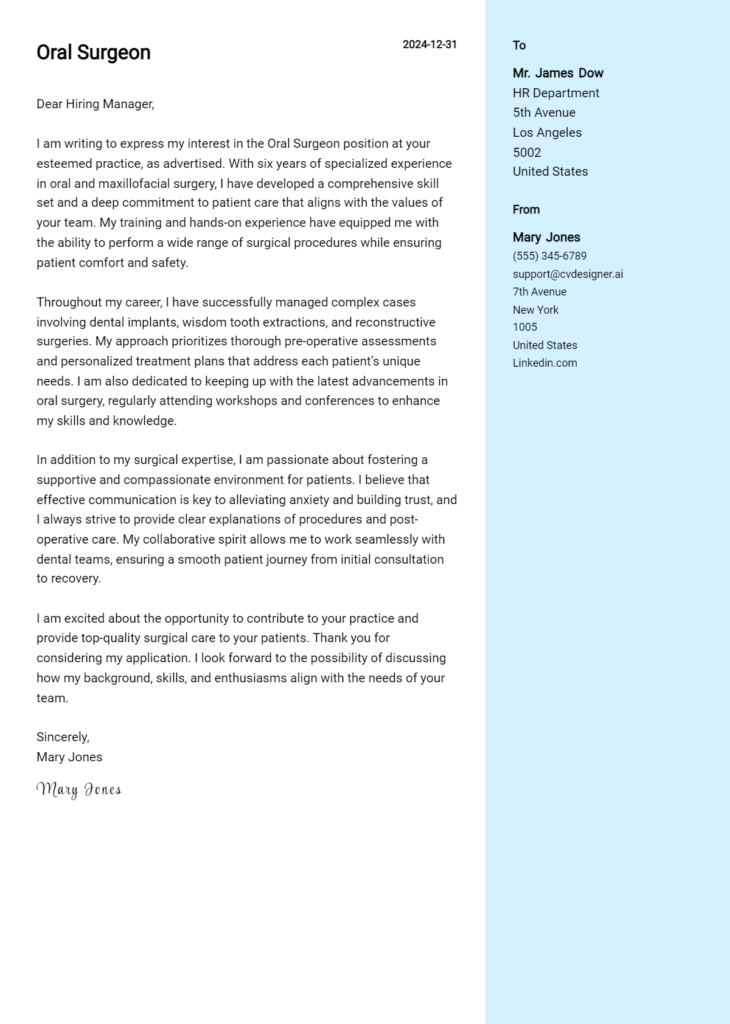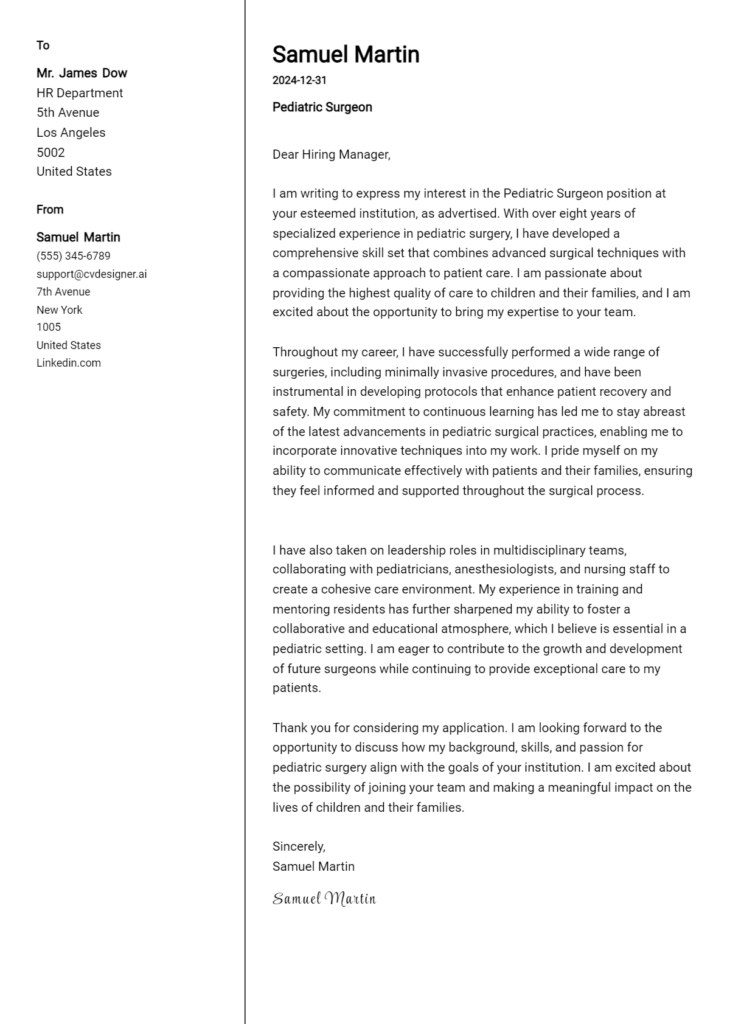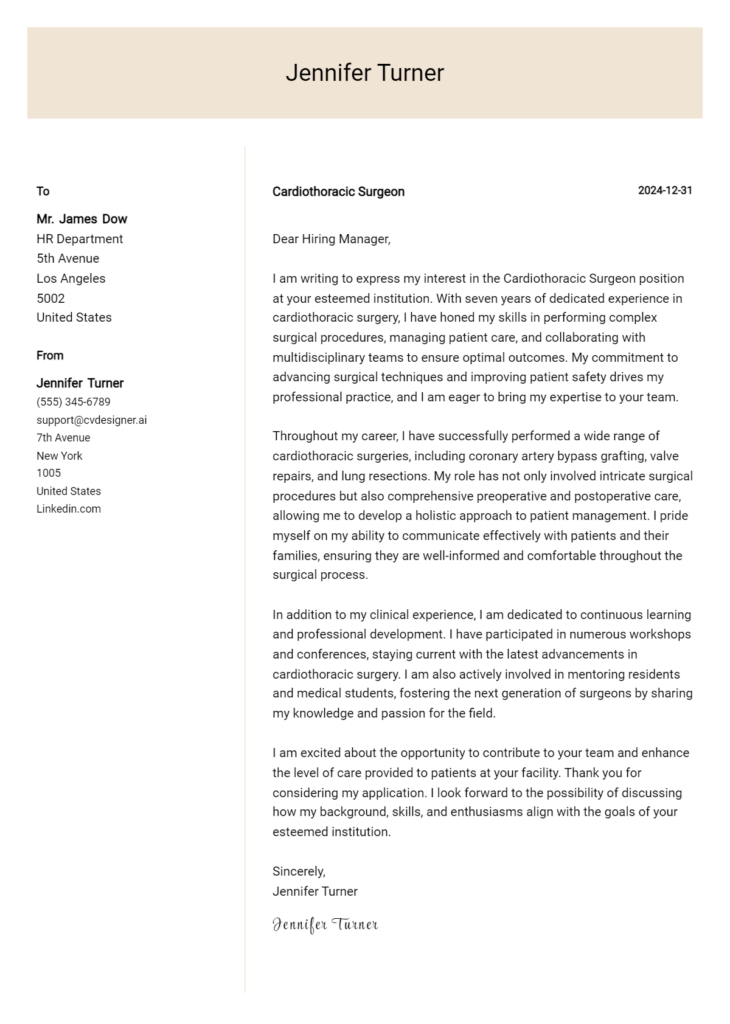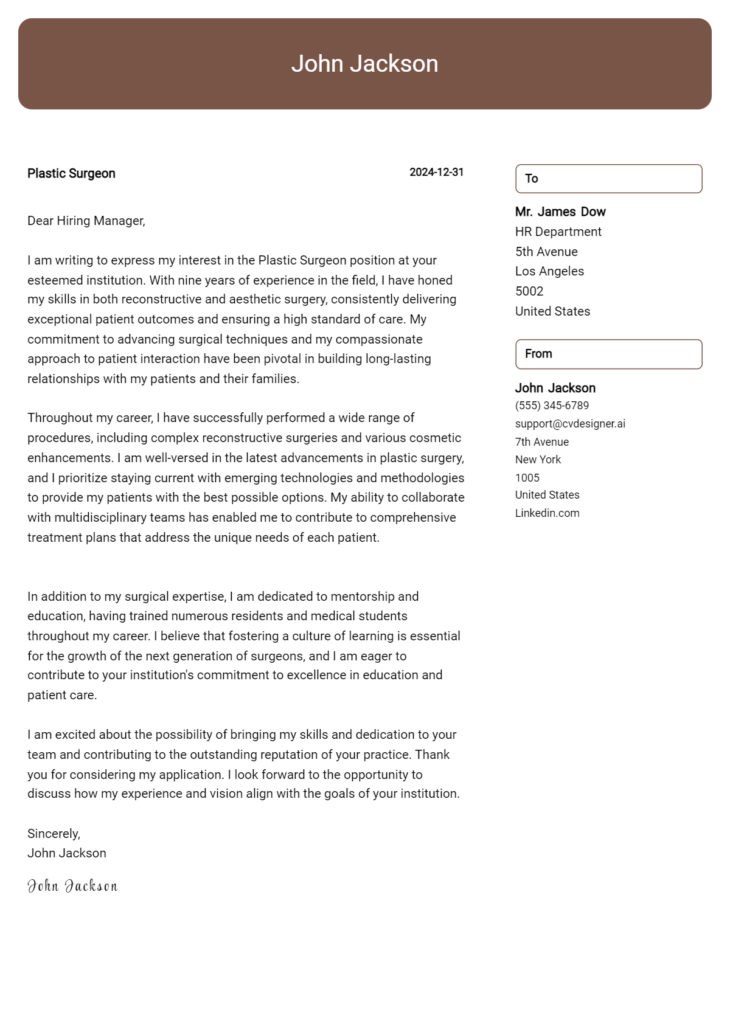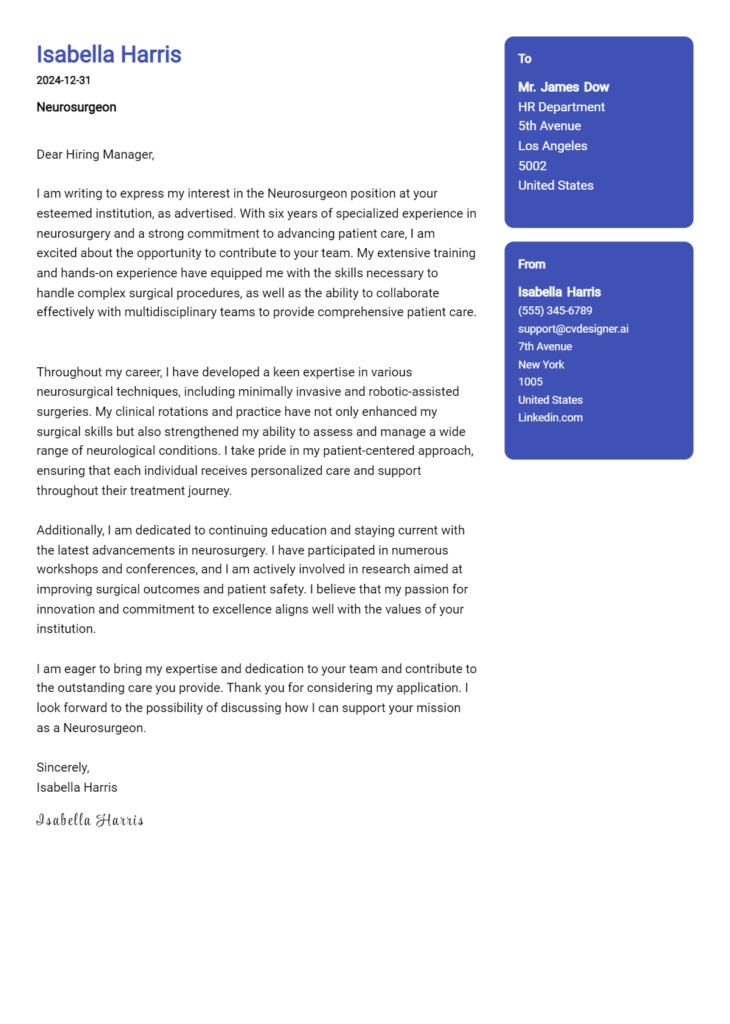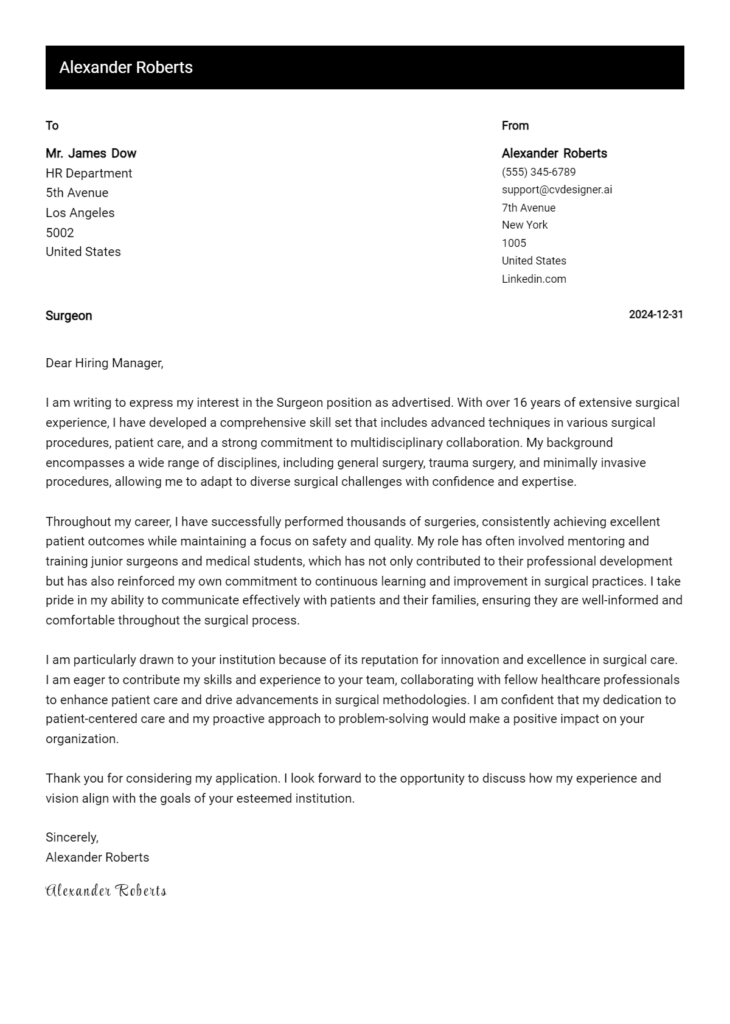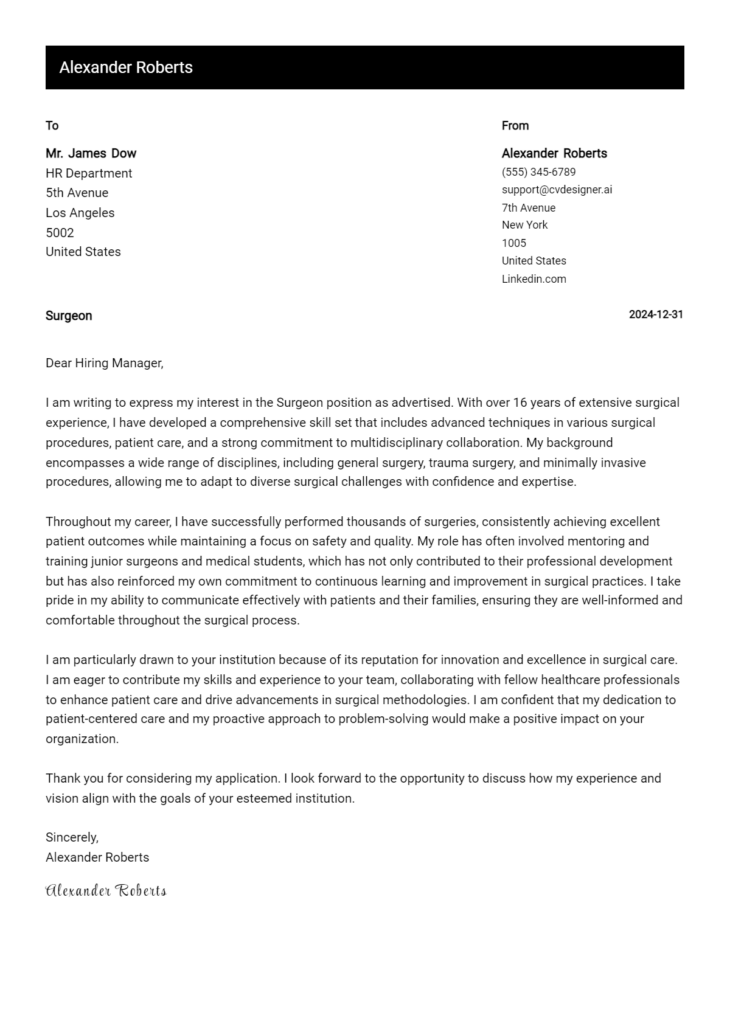Trauma Surgeon Cover Letter Examples
Explore additional Trauma Surgeon cover letter samples and guides and see what works for your level of experience or role.
How to Format a Trauma Surgeon Cover Letter?
Crafting a well-structured cover letter is essential for a Trauma Surgeon, as it not only showcases your medical expertise but also reflects your ability to perform under pressure and communicate effectively. The way you format your cover letter can significantly impact a hiring manager's perception of your candidacy. It provides a first glimpse into your professionalism, attention to detail, and organizational skills—all crucial traits in the high-stakes field of trauma surgery.
In this guide, we will explore how to structure your cover letter, offering specific insights and examples tailored for trauma surgeons to create a compelling document.
We’ll focus on the essential components of a professional cover letter, including:
- Cover Letter Header
- Cover Letter Greeting
- Cover Letter Introduction
- Cover Letter Body
- Cover Letter Closing
Each section is vital for demonstrating your qualifications and dedication to the field. Let’s delve into each part and learn how to make your trauma surgeon cover letter stand out.
The Importance of a Cover Letter Header for a Trauma Surgeon
The cover letter header is a crucial component for a Trauma Surgeon, as it sets the tone for the application and establishes a professional first impression. It should include essential information such as your name, contact information, the date, and the recipient's details. A clear and well-organized header not only conveys professionalism but also makes it easy for hiring managers to identify and contact you. A strong header reflects attention to detail, which is vital in the medical field.
Below are examples of a strong and weak cover letter header for a Trauma Surgeon:
Strong Example
Dr. Jane Doe, MD 123 Trauma Blvd City, ST 12345 (555) 123-4567 janedoe@email.com [Date] Dr. John Smith Chief of Surgery Hospital Name 456 Care St City, ST 12345
Weak Example
Jane Doe 123 Trauma Blvd janedoe@email.com Dr. Smith
The Importance of a Cover Letter Greeting
The greeting of a cover letter is a critical element that sets the tone for the entire document. It serves as the first impression for the hiring manager and reflects the applicant's professionalism and attention to detail. A personalized greeting—where the applicant addresses the hiring manager by name—demonstrates respect and genuine interest in the position. To create a strong connection, it’s essential to avoid generic greetings such as "To Whom It May Concern." Instead, take the time to research the recipient's name through the company website or LinkedIn, if necessary. This small effort can convey a sense of enthusiasm and commitment that stands out in a competitive field like trauma surgery.
Strong Greeting Example
Dear Dr. Smith,
Weak Greeting Example
To Whom It May Concern,
The Importance of a Compelling Cover Letter Introduction for a Trauma Surgeon
Crafting a compelling cover letter introduction is crucial for a Trauma Surgeon, as it serves as the first impression to the hiring manager. A well-written introduction not only captures attention but also conveys the candidate's genuine interest in the role while succinctly highlighting key skills and achievements. An engaging introduction sets the tone for the rest of the cover letter, inviting the reader to delve deeper into the candidate's qualifications. Below are examples of strong and weak cover letter introductions for a Trauma Surgeon position.
Strong Example
Dear Hiring Manager, As a dedicated and highly skilled Trauma Surgeon with over ten years of experience in high-pressure surgical environments, I am excited to apply for the Trauma Surgeon position at [Hospital/Clinic Name]. My extensive background in managing complex trauma cases, combined with my commitment to providing exceptional patient care, uniquely positions me to contribute effectively to your esteemed team. I am particularly drawn to [Hospital/Clinic Name] due to its reputation for excellence in trauma care, and I am eager to bring my expertise in advanced surgical techniques and multidisciplinary collaboration to your facility.
Weak Example
To Whom It May Concern, I am writing to apply for the Trauma Surgeon position. I have some experience in surgery and have worked in hospitals before. I think I would be a good fit for this job because I like helping people. Thank you for considering my application.
Purpose of the Cover Letter Body for a Trauma Surgeon
The body of a cover letter for a Trauma Surgeon is crucial as it serves to highlight the candidate's relevant skills, experiences, and overall value to the healthcare institution. This section allows the applicant to present specific projects or accomplishments that demonstrate their proficiency in managing trauma cases, performing complex surgeries, and collaborating with multidisciplinary teams. By articulating these qualifications effectively, the candidate can distinguish themselves from others and demonstrate their readiness to contribute to the hospital's mission of providing high-quality emergency care.
Strong Example
Dear Hiring Committee, I am writing to express my interest in the Trauma Surgeon position at [Hospital Name]. With over seven years of experience in a Level 1 trauma center, I have successfully managed over 500 trauma cases, including complex multi-system trauma surgeries. One of my notable accomplishments was leading a team in a challenging case involving a 30-year-old male with severe blunt force trauma, where we implemented a novel approach to stabilize his condition and ultimately saved his life. Additionally, I have actively contributed to the development of a trauma protocol that improved patient outcomes by reducing surgical complications by 20% over the past year. I am eager to bring my expertise and dedication to [Hospital Name] and collaborate with your esteemed team to enhance patient care. Sincerely, [Your Name]
Weak Example
Dear [Hospital Name], I want to apply for the Trauma Surgeon job. I have worked in hospitals and done surgeries before. I think I would be a good fit because I have experience. I once worked on a case that was hard, and I learned a lot from it. I hope to bring my skills to your hospital. Best, [Your Name]
Importance of the Cover Letter Closing for a Trauma Surgeon
The closing paragraph of a cover letter for a Trauma Surgeon is crucial as it serves to summarize key qualifications, reiterate enthusiasm for the role, and encourage the hiring manager to take the next steps, such as reviewing the resume or scheduling an interview. A strong closing leaves a lasting impression, reinforcing the applicant's fit for the position, while a weak closing might fail to convey confidence and commitment.
Strong Example
Thank you for considering my application for the Trauma Surgeon position at [Hospital Name]. With over ten years of experience in high-pressure surgical environments and a proven track record of successful outcomes, I am excited about the opportunity to contribute to your esteemed team. I am particularly drawn to [Hospital Name]'s commitment to innovative trauma care and would welcome the chance to discuss how my skills and experiences align with your needs. I look forward to the possibility of discussing my application further and am eager to provide additional insights into my qualifications during an interview.
Weak Example
Thanks for looking at my application. I hope it’s okay, but I think I’m a good fit for the Trauma Surgeon job. If you could, please check my resume. It would be nice to talk sometime, but no rush.
Crafting a compelling cover letter is essential for candidates applying for the role of a Trauma Surgeon. This document serves as a first impression and should effectively highlight your technical skills, problem-solving abilities, knowledge of the software development life cycle (SDLC), teamwork, and commitment to continuous learning. Below are five detailed tips to help you create an impactful cover letter that captures the attention of hiring managers.
Tips for Writing an Effective Cover Letter for a Trauma Surgeon
Highlight Technical Skills: Clearly outline your technical skills related to trauma surgery, such as proficiency in advanced surgical techniques, familiarity with the latest medical technologies, and any specialized training. Use specific examples to demonstrate how these skills have positively impacted patient outcomes.
Showcase Problem-Solving Abilities: Trauma surgeons often face unpredictable and high-pressure situations. Illustrate your problem-solving abilities by sharing instances where you successfully navigated complex cases or made critical decisions under stress. Emphasizing your analytical thinking can help convey your capability to handle emergencies effectively.
Demonstrate SDLC Knowledge: While not all trauma surgeons work directly with SDLC, understanding its principles can enhance your ability to collaborate with IT departments in developing and implementing healthcare solutions. Mention any experience with health information systems or software that supports surgical practices, showcasing your adaptability to technological advancements in the field.
Emphasize Teamwork: Trauma surgery is rarely a solo endeavor. Use your cover letter to highlight your experience working in multidisciplinary teams. Provide examples of how you have effectively communicated and collaborated with other healthcare professionals to deliver comprehensive patient care, underlining your ability to thrive in a team-oriented environment.
Express Passion for Continuous Learning: The medical field is constantly evolving, and a commitment to lifelong learning is crucial for any surgeon. Mention any additional certifications, workshops, or ongoing education that you are pursuing. This not only demonstrates your dedication to personal growth but also assures employers that you are keeping your skills up to date with current best practices.
By integrating these tips into your cover letter, you can create a persuasive narrative that showcases your qualifications as a Trauma Surgeon. For additional guidance, consider exploring cover letter templates or using a cover letter builder to enhance the presentation of your application.
Common Mistakes to Avoid in a Trauma Surgeon Cover Letter
Crafting a compelling cover letter for a Trauma Surgeon position is essential for making a positive impression on potential employers. Avoiding common mistakes can significantly enhance your chances of success. Here are some frequent pitfalls to watch out for:
Generic Language: Using vague phrases or a one-size-fits-all approach can make your letter forgettable. Tailor your letter specifically to the job and institution you are applying to.
Neglecting the Format: A poorly structured cover letter can detract from your qualifications. Follow a clear cover letter format to ensure your letter is easy to read and professional.
Lack of Specific Examples: Failing to provide concrete examples of your skills and experiences can weaken your case. Highlight specific instances where your expertise made a difference in trauma care.
Overly Technical Jargon: While you want to showcase your knowledge, using excessive medical jargon may alienate non-medical readers. Strive for a balance that demonstrates your expertise without being inaccessible.
Ignoring the Employer’s Needs: Focusing solely on what you want rather than how you can meet the employer's needs can be a major turnoff. Research the institution and align your skills with their mission and goals.
Typos and Grammatical Errors: Mistakes in spelling or grammar can undermine your professionalism. Proofread your cover letter multiple times and consider asking a colleague for feedback.
Not Including a Call to Action: Failing to invite the reader to take the next step can leave your application hanging. End with a strong statement expressing your eagerness for an interview or further discussion.
For more guidance, check out these cover letter examples to inspire your writing and ensure your cover letter stands out for all the right reasons.
Cover Letter FAQs for Trauma Surgeon
What should I include in my cover letter as a Trauma Surgeon?
When crafting your cover letter, include your medical qualifications, relevant experience, and specific skills that align with the trauma surgery position. Highlight your residency and fellowship training, any board certifications, and your experience with trauma cases. It's essential to discuss your proficiency in surgical techniques, decision-making under pressure, and teamwork abilities. Mention your familiarity with trauma protocols and your commitment to patient care. Personalize the letter by addressing the specific institution and demonstrating your enthusiasm for joining their team. Ending with a call to action, such as expressing your desire for an interview, can also be effective.
How do I convey my passion for trauma surgery in my cover letter?
To convey your passion for trauma surgery, share personal anecdotes or experiences that inspired you to pursue this specialty. Discuss your motivations, such as a particular case that impacted you or the thrill of high-stakes surgeries. Emphasize how your commitment to improving patient outcomes drives your work. Highlight any volunteer work or outreach you’ve done in trauma care, showcasing your dedication beyond the operating room. Use expressive language that reflects your enthusiasm while maintaining a professional tone. A genuine narrative can resonate with hiring managers, making them see your passion as a valuable asset to their team.
How can I tailor my cover letter for a specific trauma surgery position?
To tailor your cover letter for a specific position, start by thoroughly researching the institution and its trauma program. Understand their values, mission, and the types of cases they handle. Mention specific aspects of the program that attract you, such as advanced technology, a multidisciplinary approach, or community outreach initiatives. Align your skills and experiences with their needs by citing relevant cases or procedures you’ve handled that reflect their specialty. Use keywords from the job description to demonstrate that you’re a good fit. A customized letter shows your genuine interest and can set you apart from other candidates.
Should I include references in my cover letter?
It is generally not necessary to include references in your cover letter unless specifically requested in the job listing. Instead, focus on presenting your qualifications and experiences that make you an ideal candidate for the trauma surgeon position. Your cover letter should serve as an introduction to your resume, which can include references in its final section. However, you can mention that references are available upon request to indicate your readiness to provide them. This approach keeps your cover letter concise and focused, allowing you to highlight your skills and fit for the role without overwhelming the reader.
Build your Cover Letter in minutes
Use an AI-powered cover letter builder and have your letter done in 5 minutes. Just select your template and our software will guide you through the process.

